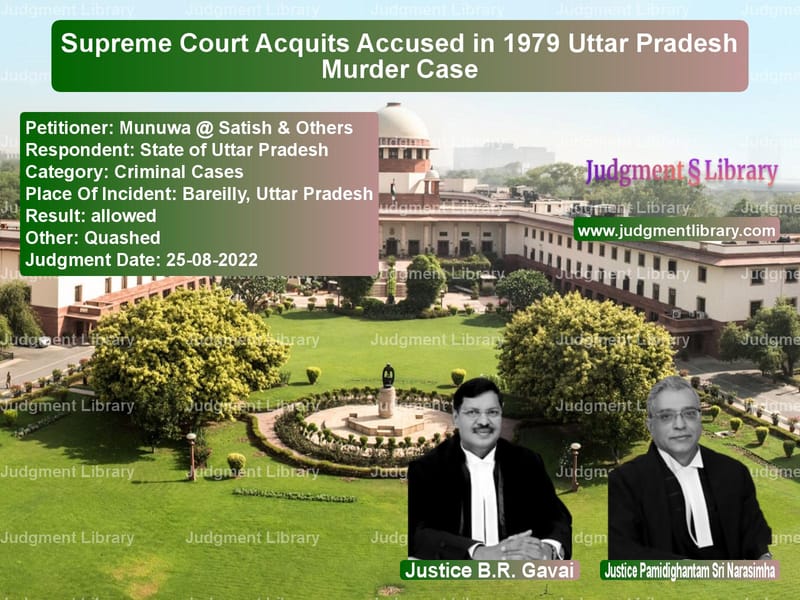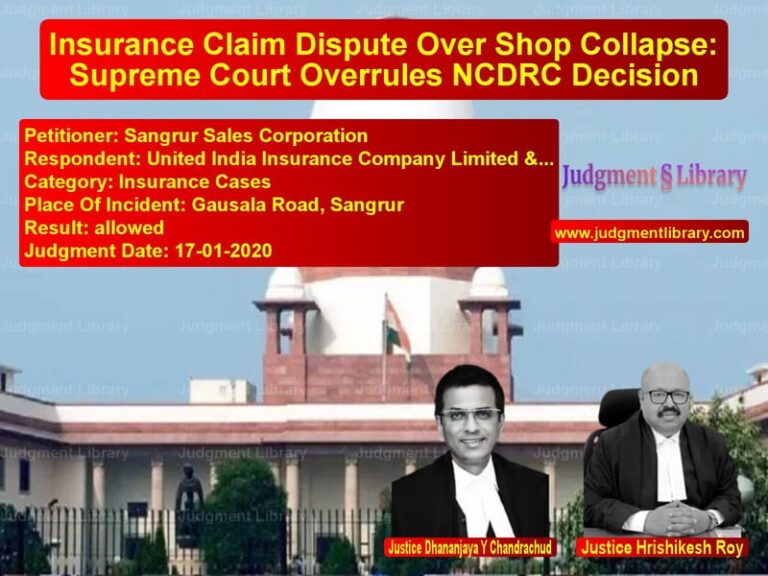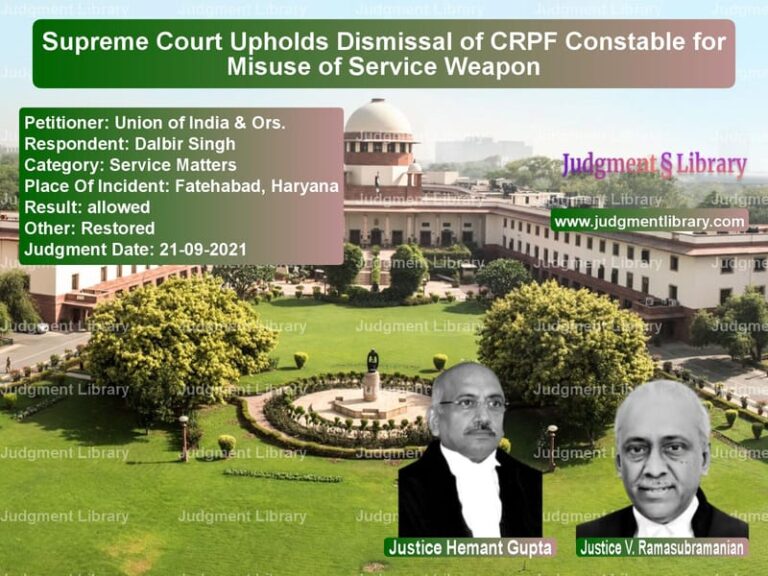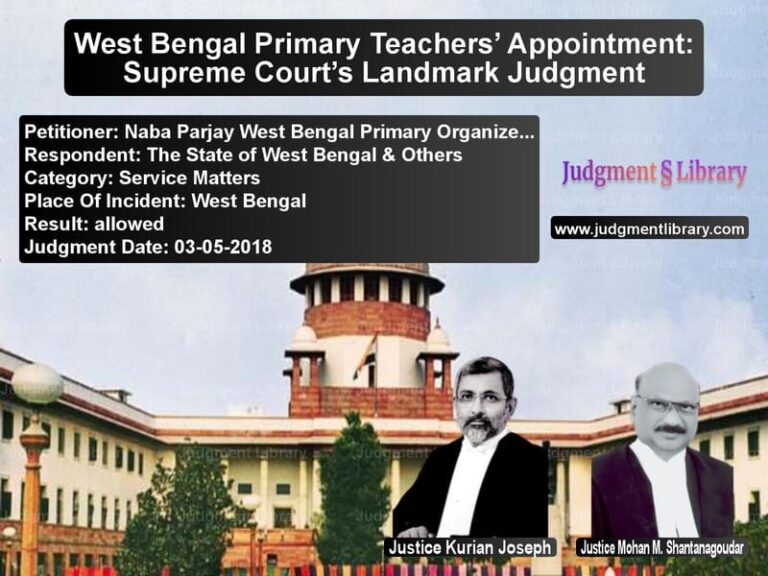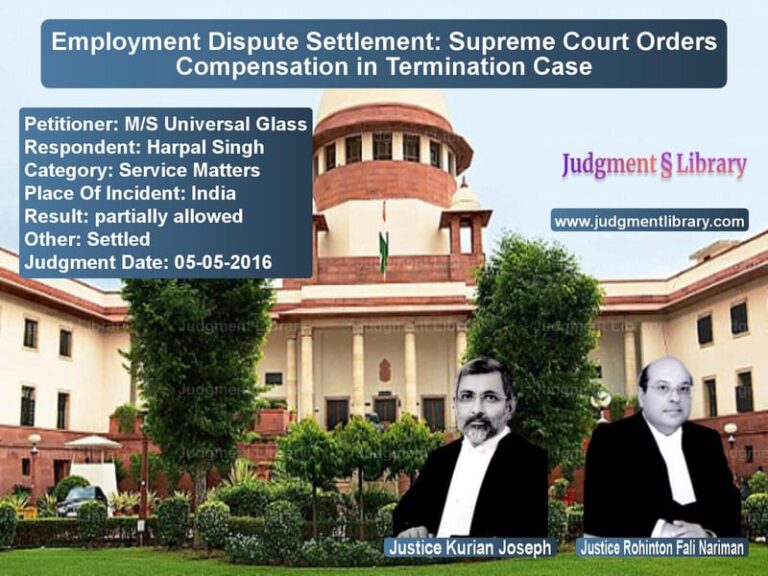Supreme Court Acquits Accused in 1979 Uttar Pradesh Murder Case
The Supreme Court of India, on August 26, 2022, delivered a landmark judgment in the case of Munuwa @ Satish & Others vs. State of Uttar Pradesh. The appeal arose from a murder case that took place in 1979, where the accused were convicted under Section 302 read with Section 34 and Section 307 read with Section 34 of the Indian Penal Code (IPC). The appellants had been sentenced to life imprisonment and four years of rigorous imprisonment, respectively. The Supreme Court, upon reviewing inconsistencies in witness statements, forensic evidence, and procedural lapses, acquitted the accused.
The judgment sets a crucial precedent for the standard of proof in criminal trials and the importance of ensuring fairness in convictions based on circumstantial and direct evidence.
Background of the Case
The case dates back to August 24, 1979, when Iqbal Bahadur Saxena, Principal of Chandra Shekhar Azad Inter-College, Giani, Uttar Pradesh, was shot by assailants while sitting in the verandah of his office. His family physician, Dr. Asghar Ali, was also present at the time of the incident.
According to the prosecution, the accused—Gullu @ Rajesh, Vimal Kumar @ Chunnoo, and Munuwa @ Satish—entered the verandah and fired gunshots at the deceased and the eyewitness (PW-6). The attackers then fled towards the north.
The injured Iqbal Bahadur Saxena was taken to the police station on a bullock cart, where he registered an FIR at 8:30 PM, naming the three accused as the shooters. He was subsequently transported to the hospital but succumbed to his injuries on August 27, 1979.
Trial Court Proceedings
The Sessions Court in Bareilly convicted all accused under:
- Section 302 read with Section 34 IPC: Life imprisonment.
- Section 307 read with Section 34 IPC: Four years of rigorous imprisonment.
The court relied heavily on the FIR as the first dying declaration and the testimonies of eyewitnesses, PW-1 and PW-6, while rejecting contradictions in statements as minor discrepancies.
High Court Appeal
The accused filed an appeal before the Allahabad High Court, which upheld the trial court’s decision. The court reasoned that:
- There were consistent accounts of the attack from the prosecution witnesses.
- Minor inconsistencies in statements did not affect the credibility of the prosecution case.
- The lack of forensic evidence was not sufficient to overturn the conviction.
Arguments Before the Supreme Court
Petitioner’s (Accused) Arguments
The defense, led by Senior Advocate R. Basant, contended:
- The FIR was fabricated and signed under suspicious circumstances.
- The testimonies of PW-1 and PW-6 contained glaring contradictions about the number of assailants and their escape route.
- There was no forensic evidence—no blood-stained clothes, weapons, or bullet cartridges were recovered.
- The place of occurrence had no bloodstains, contradicting the prosecution’s account.
- The second dying declaration recorded at the hospital had significant inconsistencies from the FIR.
Respondent’s (State of Uttar Pradesh) Arguments
The prosecution, represented by Advocate Sanjay Kumar Tyagi, countered:
- The FIR was registered by the deceased himself, making it a reliable dying declaration.
- The presence of multiple eyewitnesses corroborated the prosecution case.
- Minor inconsistencies in statements should not negate the entire prosecution case.
- The accused had a strong motive for the attack, as one of them had been expelled from the college.
Supreme Court’s Observations
1. Suspicion Over FIR Authenticity
The Court found serious doubts about the FIR:
“The FIR, allegedly written by the deceased, contains a vertical signature in different ink while the content is written horizontally. This raises a doubt about its authenticity.”
2. Contradictions in Eyewitness Testimonies
The Court highlighted key contradictions:
- PW-1 initially denied witnessing the attack but later stated he saw the accused shooting.
- PW-6, a doctor, left the injured principal and went home instead of taking him to the hospital immediately.
3. Lack of Forensic Evidence
The Court criticized the absence of critical forensic evidence:
“It is unnatural that no blood stains were found at the scene despite multiple gunshot wounds. The prosecution’s failure to explain this is fatal to its case.”
4. Rejection of Second Dying Declaration
The Court noted inconsistencies between the first and second dying declarations:
“The second dying declaration introduced new facts and a different motive, raising doubts about the reliability of both statements.”
Final Judgment
The Supreme Court set aside the conviction:
“The prosecution has failed to prove its case beyond a reasonable doubt. The accused are entitled to an acquittal.”
The Court ordered:
- Acquittal of all accused due to lack of evidence.
- Immediate release of the accused.
- Dismissal of pending interlocutory applications.
Impact of the Judgment
The ruling has significant legal implications:
- Reinforces the burden of proof in criminal cases.
- Sets a higher standard for dying declarations to be considered credible.
- Highlights the importance of forensic evidence in murder trials.
Conclusion
The Supreme Court’s ruling in Munuwa @ Satish vs. State of Uttar Pradesh underscores the importance of a fair trial and the need for strong, corroborative evidence in criminal convictions. By acquitting the accused, the Court reaffirmed that justice must be based on concrete proof, not just suspicion.
Petitioner Name: Munuwa @ Satish & Others.Respondent Name: State of Uttar Pradesh.Judgment By: Justice B.R. Gavai, Justice Pamidighantam Sri Narasimha.Place Of Incident: Bareilly, Uttar Pradesh.Judgment Date: 25-08-2022.
Don’t miss out on the full details! Download the complete judgment in PDF format below and gain valuable insights instantly!
Download Judgment: munuwa-@-satish-&-ot-vs-state-of-uttar-prade-supreme-court-of-india-judgment-dated-25-08-2022.pdf
Directly Download Judgment: Directly download this Judgment
See all petitions in Murder Cases
See all petitions in Bail and Anticipatory Bail
See all petitions in Custodial Deaths and Police Misconduct
See all petitions in Judgment by B R Gavai
See all petitions in Judgment by P.S. Narasimha
See all petitions in allowed
See all petitions in Quashed
See all petitions in supreme court of India judgments August 2022
See all petitions in 2022 judgments
See all posts in Criminal Cases Category
See all allowed petitions in Criminal Cases Category
See all Dismissed petitions in Criminal Cases Category
See all partially allowed petitions in Criminal Cases Category

